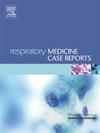Severe denosumab-induced hypocalcemia requiring long-term intensified medication in a patient with EGFR-mutant lung cancer and diffuse osteoblastic bone metastases
IF 0.8
Q4 RESPIRATORY SYSTEM
引用次数: 0
Abstract
Lung cancer often causes bone metastasis, and denosumab is administered to bone metastases to prevent bone-related adverse events. One of the important side effects of denosumab is hypocalcemia, but this is generally not a problem, as it is used with calcium supplementation. A 48-year-old non-smoker male was diagnosed with lung adenocarcinoma with EGFR L858R mutation with diffuse bone metastases. Three days after receiving denosumab, the patient developed weakness and numbness in his limbs and was diagnosed with drug-induced hypocalcemia due to denosumab. It takes more than 4 months for treating the hypocalcemia in this case with continuous intravenous infusion of calcium gluconate with oral calcium supplementation for 2 months of hospitalization and subsequent 2 months of outpatient treatment with intermittent intravenous infusion of calcium gluconate three times a week along with oral supplementation. Tartrate-resistant acid phosphatase-5b (TRACP-5b), a marker of bone resorption, was a biomarker for the required amount of calcium in this case. Patients with lung cancer with diffuse osteoblastic bone metastases could develop severe hypocalcemia and require long-term calcium supplementation.
egfr突变肺癌和弥漫性成骨细胞骨转移患者需要长期强化治疗的严重地地单抗诱导的低钙血症
肺癌常引起骨转移,denosumab用于骨转移以预防骨相关不良事件。denosumab的一个重要副作用是低钙血症,但这通常不是问题,因为它与钙补充剂一起使用。一例48岁非吸烟者男性被诊断为EGFR L858R突变伴弥漫性骨转移的肺腺癌。患者在接受denosumab治疗3天后出现四肢无力和麻木,诊断为denosumab引起的药物性低钙血症。本例低钙患者住院治疗2个月,持续静脉滴注葡萄糖酸钙并口服补钙,门诊治疗2个月,每周间歇静脉滴注葡萄糖酸钙3次并口服补钙。抗酒石酸酸性磷酸酶5b (TRACP-5b)是骨吸收的标志物,是本病例中钙需求量的生物标志物。肺癌伴弥漫性成骨细胞骨转移的患者可发生严重的低钙血症,需要长期补钙。
本文章由计算机程序翻译,如有差异,请以英文原文为准。
求助全文
约1分钟内获得全文
求助全文
来源期刊

Respiratory Medicine Case Reports
RESPIRATORY SYSTEM-
CiteScore
2.10
自引率
0.00%
发文量
213
审稿时长
87 days
 求助内容:
求助内容: 应助结果提醒方式:
应助结果提醒方式:


